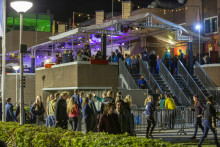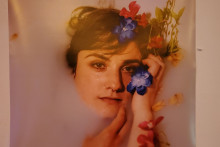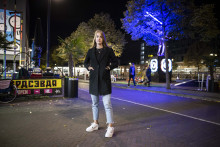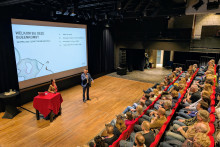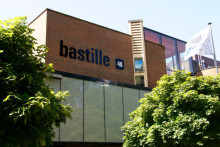Why this new campaign regarding sexual harassment?
Sloot: ‘It’s not Vestingbar-specific, but a national movement. There are also different campaigns in other bars and in other cities. For instance, one can order a special shot and you will be guided to the back, so personnel can ask what’s wrong or call the police. We discussed that option, but think that the issue would be that news on campus spreads fast and then there is no point in a secret code anymore. Instead, we hung posters in the bar and added more elements to our training. Now, when we have new staff members, they are also taught how to see when someone is being uncomfortable and how to approach that situation. We decided that this type of campaign would be more effective.’
How do you see if someone is not okay?
Sloot: ‘I have a good example of this, and luckily the person in question was okay. She sat at the bar while I was bartending, and she got approached by a guy. His phrasing even made me uncomfortable, so I went there to pretend to be in a relationship with her. It didn’t work in making him go away, but at least I knew she was okay, and she knew that we would make sure she was okay. The rest of the evening the entire staff also kept an eye on the situation.’
De Groot: ‘It really helps that here in Enschede we have a close-knit community. A lot of people know each other and even if that’s not the case, people look out after another. Often, approaching a possible victim and making sure your presence is known will already help someone feels safer.’
Did you have a lot of incidents of sexual harassment before?
Sloot: ‘We don’t think there are a lot of incidents on regular nights, so maybe they luckily don’t happen, or it is hard to notice them. At bigger parties, people have often been thrown out for sexual harassment. When we see it, they’re out. We have a zero-tolerance policy.’
De Groot: ‘It is just very hard to notice. I recently talked to a fellow student, and she said it happens a lot. Not just in the Vestingbar, but in bars in general. It’s very hard to notice it happening in a big crowd. If you are brave enough as the victim and tell the security or the bar personnel, it’s still often just a ‘he said she said’ situation, so it’s very hard to prove whether someone acted inappropriately, especially during big events. The solution probably lies in awareness of the crowd.’
Sloot: ‘This is also our goal of this campaign. We don’t want to put the responsibility purely on our personnel, we also raise awareness of the public. The people who have helped me when I was in situations like this, were usually fellow guests. They pretended to know me and indeed asked ‘Are you okay?’ or let me know that someone was staring at me. To me, this has always been the best help: other people being aware that it happens.
I also see that since we have opened again after the lockdown, people seem to have forgotten how to behave and how the bar works. There are more incidents in general. People start messing in simple ways, such as with our glassware, but also in the way of sexual harassment: people are not respectful anymore, also not towards personnel. Most people in the bar are regulars and they probably wouldn’t do anything wrong. At least not in our bar, since they know our zero-tolerance policy.’
What do you hope to achieve with the campaign?
Sloot: ‘The sad thing is that often, people genuinely don’t know that their behaviour is unacceptable and they’re honestly surprised that they have made someone uncomfortable. This is one of the reasons why we hope our campaign raises awareness to everyone: to the victims, to the perpetrators, but also to the bystanders, who are very important as well.’


